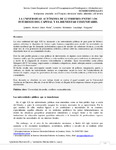
Please use this identifier to cite or link to this item:
http://ricaxcan.uaz.edu.mx/jspui/handle/20.500.11845/488Full metadata record
| DC Field | Value | Language |
|---|---|---|
| dc.contributor | 90730 | es_ES |
| dc.contributor.other | 0000-0001-8473-5263 | es_ES |
| dc.coverage.spatial | Guerrero | es_ES |
| dc.creator | González Hernández, Guadalupe Margarita | - |
| dc.creator | Quintero Romero, Dulce María | - |
| dc.date.accessioned | 2018-02-27T18:48:02Z | - |
| dc.date.available | 2018-02-27T18:48:02Z | - |
| dc.date.issued | 2017-12-01 | - |
| dc.identifier | info:eu-repo/semantics/publishedVersion | es_ES |
| dc.identifier.issn | ESSN: 2590-5007 | es_ES |
| dc.identifier.uri | http://hdl.handle.net/20.500.11845/488 | - |
| dc.description | The environmental crisis of the 21st century has reached the public universities of much of Mexico, who face the dilemma of forming competitive human capital to meet the needs of a neoliberal model that requires professionals capable of attending to their technical solutions, and thus leave behind of itself the generation of thought, reflection and debate about the consequences that the predatory system has on local communities. This has been possible thanks to these intervention policies, in some notorious cases and in others under subtle formats, which have allowed the necessary measures to condition their subsistence -through the allocation of extraordinary resources and subsidies- to reconvert them as affirms Márquez (2017) "in business forms or competitive entities, where surreptitiously autonomy opens the way to heteronomy". The fact is more worrisome when it occurs in scenarios of poverty, marginalization, war and violence in which universities qualify their social commitment in favor of strengthening employment sources, although the generators of these work against the environment and the well-being of communities. . This discussion is addressed in this paper, which analyzes the role assumed by the Autonomous University of Guerrero, located in southern Mexico, in the face of the arrival of mining companies in a large part of the territory. | es_ES |
| dc.description.abstract | La crisis ambiental del siglo XXI ha alcanzado a las universidades públicas de gran parte de México, quienes enfrentan la disyuntiva de formar capital humano competitivo para atender las necesidades un modelo neoliberal que les demanda profesionistas capaces de atender sus soluciones técnicas, y con ello dejar tras de sí la generación de pensamiento, reflexión y debate sobre las consecuencias que el sistema depredador tiene en las comunidades locales. Esto ha sido posible gracias a esas políticas de intervención, en algunos casos notorias y en otras bajo formatos sutiles, que han permitido el llevar a cabo medidas necesarias para condicionar su subsistencia –a través de la asignación de recursos extraordinarios y subsidios- hasta reconvertirlas como afirma Márquez (2017) “en formas empresariales o entidades competitivas, donde subrepticiamente la autonomía abre paso a la heteronomía”. El hecho resulta más preocupante cuando ocurre en escenarios de pobreza, marginación, guerra y violencia en donde las universidades matizan su compromiso social en favor del fortalecimiento de fuentes de empleo, aunque las generadoras de estos atenten contra el medio ambiente y el bienestar de las comunidades. Esta discusión es abordada en este trabajo donde se analiza el papel asumido por la Universidad Autónoma de Guerrero, ubicada al sur de México frente a la llegada de las empresas mineras en gran parte del territorio. | es_ES |
| dc.language.iso | spa | es_ES |
| dc.publisher | Universidad Surcolombiana | es_ES |
| dc.publisher | Editorial USCO | es_ES |
| dc.relation | https://www.journalusco.edu.co/index.php/cempresarial/article/view/1531 | es_ES |
| dc.relation.ispartof | https://www.journalusco.edu.co/index.php/cempresarial/index | es_ES |
| dc.relation.uri | generalPublic | es_ES |
| dc.rights | Attribution-NonCommercial-ShareAlike 3.0 United States | * |
| dc.rights.uri | http://creativecommons.org/licenses/by-nc-sa/3.0/us/ | * |
| dc.source | Revista Crecer Empresarial: Journal of Management and Development, número especial 1. | es_ES |
| dc.subject.classification | CIENCIAS SOCIALES [5] | es_ES |
| dc.subject.other | Universidad | es_ES |
| dc.subject.other | Desarrollo | es_ES |
| dc.subject.other | Conflictos socioambientales | es_ES |
| dc.subject.other | University | es_ES |
| dc.subject.other | Development | es_ES |
| dc.subject.other | Socioambiental disruption | es_ES |
| dc.title | La Universidad Autónoma de Guerrero: Entre los intereses del capital y el bienestar comunitario | es_ES |
| dc.type | info:eu-repo/semantics/article | es_ES |
| Appears in Collections: | *Documentos Académicos*-- UA Estudios del Desarrollo | |
Files in This Item:
| File | Description | Size | Format | |
|---|---|---|---|---|
| La Universidad Autónoma de Guerrero.pdf | 438,22 kB | Adobe PDF |  View/Open |
This item is licensed under a Creative Commons License
